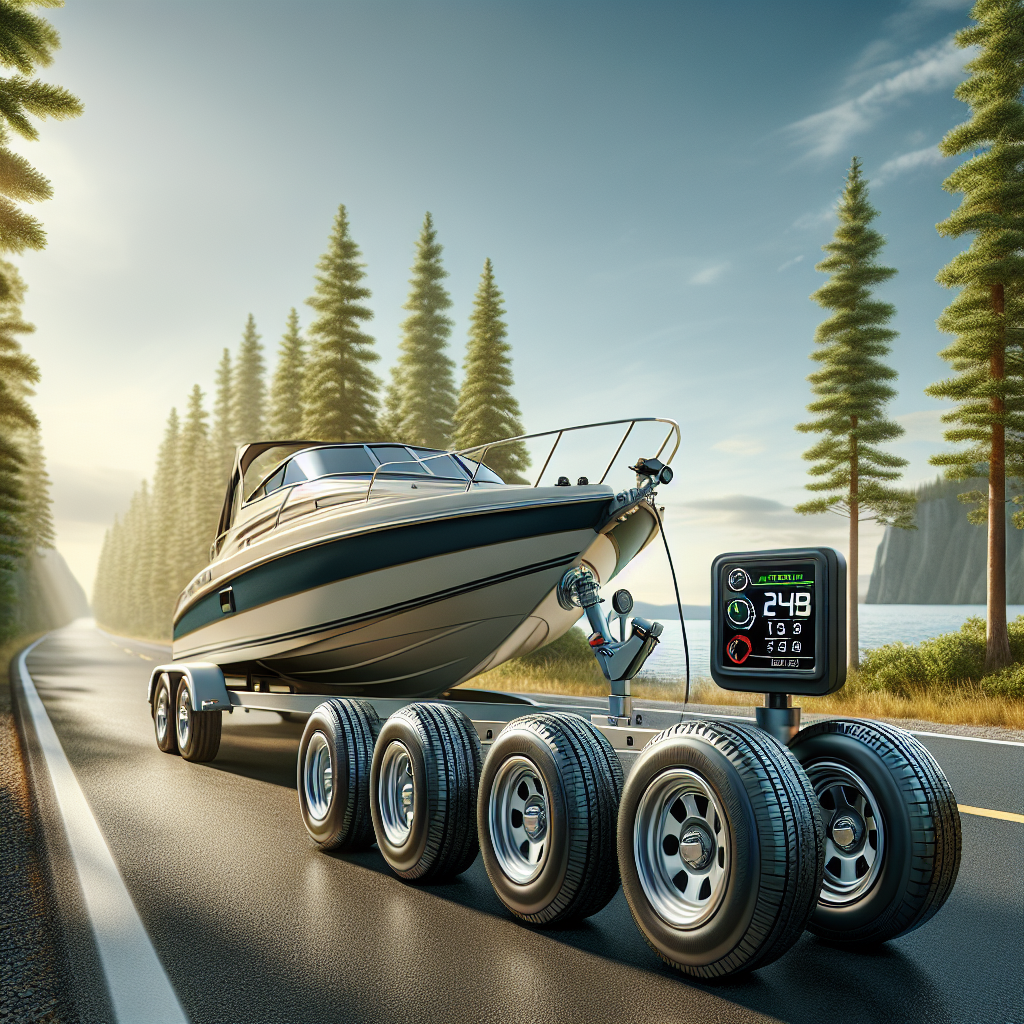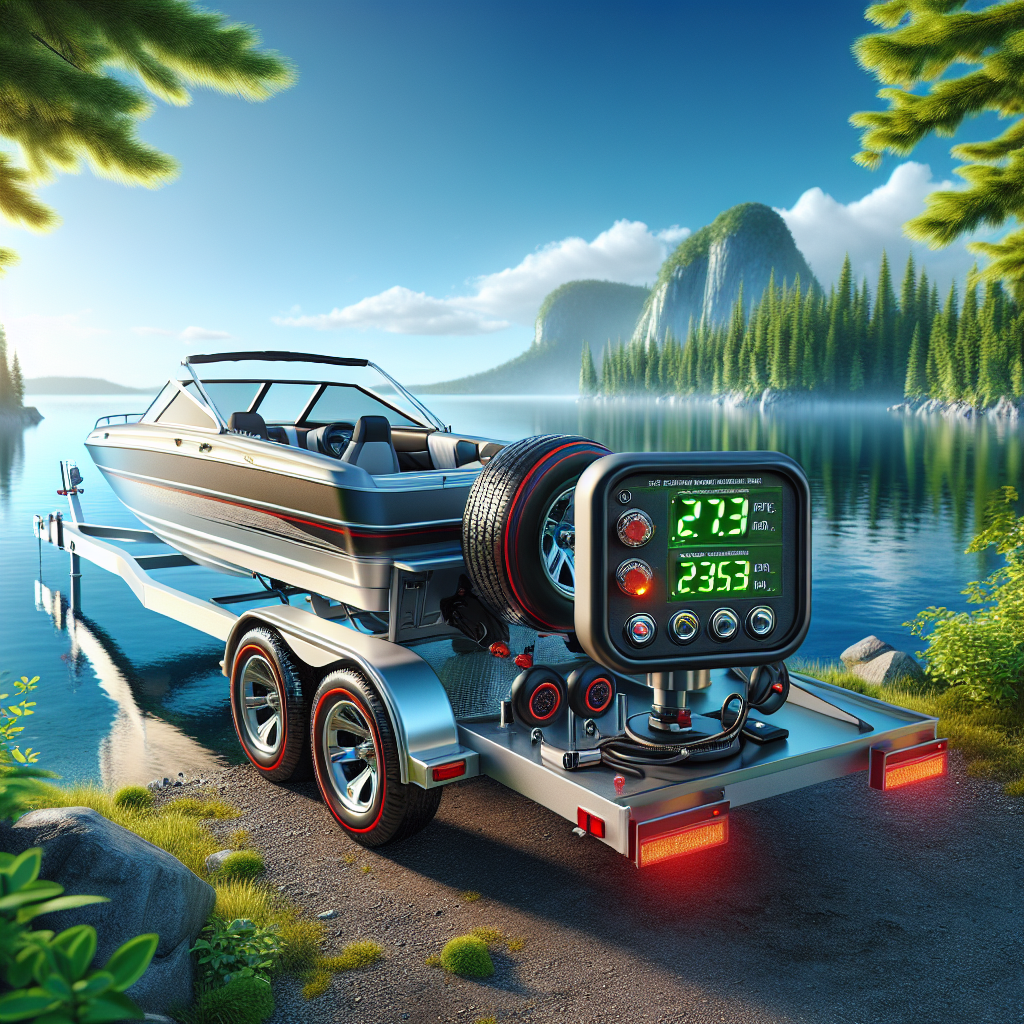When embarking on a journey with your boat trailer, ensuring that your tires are in optimal condition should be a top priority. This is where a boat trailer TPMS (Tire Pressure Monitoring System) comes into play. A TPMS is an advanced technology that continuously monitors tire pressure, providing real-time data to the user. By integrating this system into your trailer, you can significantly enhance your safety and efficiency on the road.
Understanding the importance of a boat trailer TPMS involves recognizing its role in preventing tire-related incidents. Here are some key benefits:
- Prevention of Tire Blowouts: A TPMS alerts you to low tire pressure, allowing for timely maintenance and reducing the risk of blowouts.
- Improved Fuel Efficiency: Properly inflated tires lead to better fuel economy, saving you money on long trips.
- Enhanced Safety: Monitoring tire conditions minimizes the chances of accidents caused by tire failures, ensuring a safer journey for you and your passengers.
Investing in a boat trailer TPMS is a proactive step towards safeguarding your travels. With the ability to monitor axle temperature and tire data, you can prevent catastrophic failures before they occur. Tow with peace of mind, knowing that trailerwatchdog is standing guard. Visit trailerwatchdog.com to learn more about how we can transform your trailer into a smart trailer.
How Boat Trailer TPMS Enhances Safety

Safety is paramount when towing a boat trailer, and a boat trailer TPMS plays a crucial role in enhancing that safety. The system actively monitors tire conditions and provides essential data that can prevent accidents and ensure a smooth journey.
One of the primary ways a TPMS enhances safety is through its real-time monitoring capabilities. By continuously checking tire pressure and temperature, it can quickly alert the driver to any irregularities. For example:
- Low Tire Pressure Alerts: A sudden drop in tire pressure can lead to dangerous blowouts. The TPMS will notify you immediately, allowing you to pull over safely and address the issue before it escalates.
- Temperature Monitoring: Overheating tires can also be a sign of trouble, potentially leading to tire failure. The TPMS tracks tire temperatures, giving you an early warning if a tire is running too hot, which could indicate a problem.
- Data Logging: Many TPMS systems keep a history of tire performance data, which can help identify patterns and predict potential issues before they occur. This predictive capability is invaluable for maintaining safety over time.
Furthermore, a TPMS contributes to overall vehicle stability. Properly inflated tires ensure better traction and handling, especially during critical maneuvers such as sudden stops or sharp turns. This stability is particularly important when towing a heavy load, as it minimizes the risk of skidding or losing control.
By investing in a boat trailer TPMS, you are not only enhancing your safety but also that of others on the road. The peace of mind that comes with knowing your trailer is equipped with this advanced monitoring system is invaluable for any towing scenario.
Preventing Tire Failures with TPMS Technology

Tire failures can lead to serious accidents, especially when towing a boat trailer. Fortunately, TPMS technology is designed to mitigate these risks by providing crucial data that allows for proactive maintenance and timely interventions.
One of the most significant advantages of a TPMS is its ability to detect tire issues before they escalate into catastrophic failures. Here’s how it works:
- Real-Time Alerts: The TPMS continuously monitors tire pressure and temperature, providing real-time notifications to the driver. If a tire is losing pressure or overheating, the system will alert you immediately, allowing you to take corrective actions before a failure occurs.
- Predictive Maintenance: By analyzing historical data on tire performance, TPMS can help predict when a tire may need maintenance or replacement. This foresight allows you to address potential issues before they lead to tire blowouts or other failures.
- Enhanced Inspection Protocols: With a TPMS in place, you can establish more effective inspection routines. Regular checks of tire pressure and temperature data can help identify any anomalies early on, ensuring that your tires are always in optimal condition.
Moreover, the technology allows for better understanding and management of tire wear and tear. Uneven wear can be a sign of alignment issues or overloading, both of which can contribute to tire failure. By keeping a close watch on tire performance, a TPMS helps you maintain even wear, prolonging the life of your tires.
In conclusion, implementing TPMS technology on your boat trailer is a proactive approach to preventing tire failures. The ability to receive immediate alerts and access critical data empowers you to make informed decisions, ensuring both your safety and the longevity of your tires.
Key Features of Effective Boat Trailer TPMS

When selecting a boat trailer TPMS, it’s important to understand the key features that make a system effective in enhancing safety and performance. A well-designed TPMS offers several functionalities that are crucial for monitoring your trailer's tires. Here are some essential features to look for:
- Real-Time Monitoring: An effective TPMS provides continuous monitoring of tire pressure and temperature, delivering real-time data directly to your smartphone or dedicated display. This feature ensures that any potential issues are identified instantly, allowing you to take action before problems escalate.
- Wireless Communication: Opt for a TPMS that utilizes wireless technology to transmit data. This eliminates the need for cumbersome wiring and allows for easier installation and maintenance. Wireless systems often provide better flexibility in terms of sensor placement and positioning.
- Multiple Sensor Compatibility: The best TPMS can support multiple sensors, allowing you to monitor all tires on your boat trailer as well as any additional trailers you may own. This feature ensures comprehensive coverage and makes it easier to manage multiple vehicles.
- Low Battery Alerts: A good TPMS will notify you when the sensor batteries are running low, ensuring that you never miss critical tire data due to dead batteries. This proactive alert system helps maintain the reliability of your monitoring system.
- Durability and Weather Resistance: Given the outdoor conditions that boat trailers often face, choose a TPMS designed to withstand various weather elements. Look for sensors that are water-resistant and capable of functioning in extreme temperatures.
Lastly, consider a TPMS with a user-friendly interface that simplifies navigation and enhances usability. The ability to quickly access tire data and alerts is vital for safe towing. By focusing on these key features, you can ensure that your boat trailer TPMS is both effective and reliable, enhancing your overall towing experience.
Choosing the Right Boat Trailer TPMS System

Selecting the right boat trailer TPMS is crucial for ensuring safety and performance on the road. With numerous options available, it can be daunting to determine which system best meets your needs. Here are some key considerations to guide your decision-making process:
- Compatibility: Ensure that the TPMS you choose is compatible with your specific boat trailer. Check the weight capacity and tire specifications to confirm that the system can adequately monitor your setup.
- Sensor Quality: The effectiveness of a TPMS largely depends on the quality of its sensors. Look for systems that employ high-quality materials and advanced technology to provide accurate and reliable readings.
- Data Display: Consider how the TPMS presents data. Systems that offer clear and intuitive displays—whether on a dedicated monitor or through a smartphone app—make it easier to gauge tire health at a glance.
- Range and Signal Strength: A robust TPMS should provide a strong signal over a considerable distance. Make sure to choose a system that can effectively communicate between the sensors and the display unit, even when the trailer is in motion.
- Price and Warranty: While it may be tempting to choose the cheapest option, investing in a quality TPMS can save you money in the long run by preventing tire blowouts and other incidents. Additionally, look for systems that come with a warranty, as this can provide peace of mind regarding the product's durability and reliability.
Finally, research user reviews and ratings to gain insights into real-world performance. Speaking with fellow boaters or trailer owners can also help you gather recommendations and experiences that inform your decision.
Conclusion: Ensuring Safe Travels with TPMS
In conclusion, investing in a boat trailer TPMS is essential for ensuring safe travels. The benefits of having a reliable tire pressure monitoring system extend beyond mere convenience; they encompass safety, efficiency, and peace of mind while on the road. With features that help prevent tire failures and monitor axle temperatures, a TPMS acts as an invaluable companion during your journeys.
By keeping track of tire conditions and providing real-time data, you can avoid the hassle of unexpected breakdowns and the dangers associated with tire blowouts. Moreover, a well-maintained trailer equipped with a TPMS enhances your overall driving experience, allowing you to focus on enjoying your time on the water rather than worrying about potential issues.
As you prepare for your next adventure, remember that the right TPMS can make all the difference. Tow with peace of mind, knowing that TrailerWatchdog is standing guard. Visit trailerwatchdog.com for more information on how we can help turn your trailer into a smart trailer.








